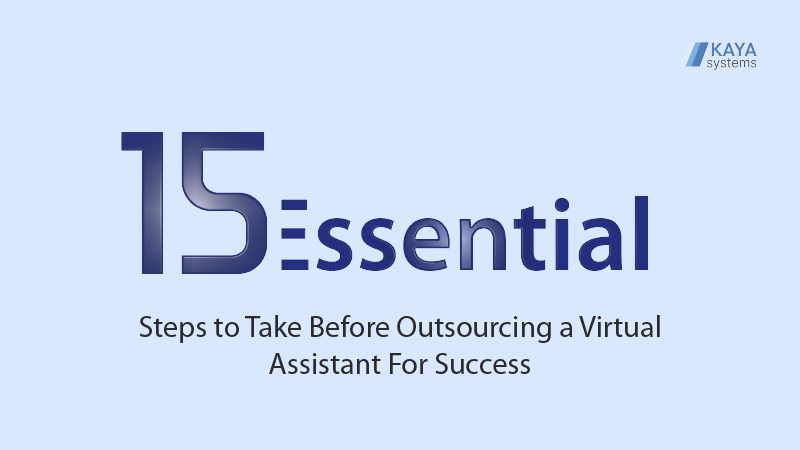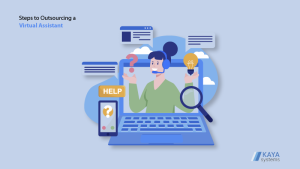
Introduction:
Hiring a virtual assistant (VA) can be a transformative decision for individuals and businesses seeking to offload time-consuming tasks and boost productivity. However, the process of finding and onboarding the right virtual assistant requires careful planning and consideration to ensure a successful and harmonious working relationship. Before entrusting your business operations to a remote professional, there are several crucial steps to take to guarantee a seamless collaboration and maximize the benefits of outsourcing. In this comprehensive guide, we will explore 15 essential things to do before outsourcing a virtual assistant, equipping you with the knowledge and insights needed to make informed decisions and set the stage for a productive partnership.
Steps to Outsourcing a Virtual Assistant

- Assess Your Needs and Tasks:
Before seeking a virtual assistant, it is imperative to identify the specific tasks and responsibilities you wish to delegate. Make a comprehensive list of the daily, weekly, and monthly tasks that consume your time and evaluate which ones can be effectively outsourced. This assessment will not only help you determine the skill set required in a virtual assistant but also clarify your expectations for the partnership.
- Define Clear Goals and Expectations:
Establishing clear goals and expectations is essential for a successful working relationship with a virtual assistant. Outline the key objectives you want to achieve through outsourcing and articulate the results you expect from your VA. Clearly define roles, responsibilities, and performance indicators to set the foundation for accountability and mutual understanding.
- Create Detailed Job Descriptions:
Crafting detailed job descriptions is vital for attracting the right candidates and ensuring they possess the necessary qualifications and experience. Be specific about the tasks, skills, and tools required for the role, as well as any preferred working hours or time zone compatibility. A well-defined job description will not only help potential VAs understand the scope of work but also allow you to filter and shortlist candidates effectively.
- Conduct Thorough Research and Vetting:
The process of finding the right virtual assistant requires thorough research and vetting. Utilize online platforms, freelancing websites, and professional networks to source potential candidates. Look for VAs with relevant experience, positive reviews, and a strong work history. Request samples of their previous work and check references to gain insights into their reliability and competence.
- Consider Language and Communication Skills:

Effective communication is the cornerstone of a successful virtual assistant relationship. Ensure that your chosen VA possesses strong language skills, both written and spoken, as miscommunications can lead to costly errors and delays. Conduct interviews or video calls to assess their communication abilities and gauge their responsiveness.
- Evaluate Technical Proficiency:
Depending on your requirements, your virtual assistant may need to be proficient in specific software, tools, or platforms. Verify their technical skills and knowledge in the relevant areas to ensure a seamless integration into your existing workflows. Additionally, consider their ability to adapt to new technologies and learn quickly, as this trait can be invaluable for long-term collaboration.
- Establish Clear Communication Channels:
Set up and agree on communication channels that best suit your preferences and the VA’s capabilities. Popular options include email, instant messaging, project management tools, and video conferencing. Emphasize the importance of regular check-ins and updates to maintain transparency and ensure both parties are on the same page.
- Test with a Trial Project:
Before committing to a long-term contract, consider starting with a trial project or a smaller scope of work. This allows you to assess the virtual assistant’s skills, work style, and compatibility with your business. It also provides an opportunity for the VA to understand your expectations and adapt to your processes.
- Discuss Working Hours and Time Zones:
Working with a virtual assistant often involves navigating different time zones. Clarify your preferred working hours and check if they align with the VA’s availability. Address potential overlaps or differences in time zones to ensure that the working relationship is practical and convenient for both parties.
- Set Data Security and Confidentiality Measures:
Outsourcing certain tasks may involve sharing sensitive information. Implement data security and confidentiality measures to protect your business data and intellectual property. Have your virtual assistant sign a non-disclosure agreement (NDA) to ensure the confidentiality of proprietary information.
- Provide Comprehensive Onboarding:
Smooth onboarding is crucial for ensuring your virtual assistant understands your business, processes, and expectations from the start. Conduct thorough training sessions, provide access to necessary tools and resources, and offer clear guidance on your brand identity and tone of communication.
- Establish Performance Monitoring and Feedback:

Establish a system for monitoring your virtual assistant’s performance and providing feedback. Regularly assess their progress, offer constructive feedback, and acknowledge their achievements. This open communication will help nurture a culture of continuous improvement and boost the VA’s motivation.
- Define Payment Terms and Contracts:
Clearly outline the payment terms, frequency, and method of payment in the contract. Additionally, define the contract duration and termination clauses. Having a well-drafted agreement in place safeguards both parties’ interests and fosters a sense of professionalism.
- Plan for Contingencies and Backup:
Virtual assistants, like any professionals, may face unforeseen circumstances that impact their availability. Discuss contingency plans and establish backup support to ensure that your tasks and projects can continue without major disruptions.
- Cultivate a Positive Working Relationship:
Treat your virtual assistant as a valued member of your team and foster a positive working relationship. Show appreciation for their efforts, provide opportunities for professional growth, and create an inclusive and supportive work environment.
Outsourcing to a virtual assistant can be a game-changing decision, provided you take the necessary steps to ensure a seamless and productive collaboration. By carefully assessing your needs, vetting potential candidates, and establishing clear communication and expectations, you set the stage for a successful partnership that maximizes efficiency and productivity. Taking these essential pre-outsourcing measures will not only enhance your business operations but also pave the way for a long-term, mutually beneficial relationship with your virtual assistant.
Benefits of Hiring A VA:

Hiring a VA offers numerous benefits for individuals and businesses alike. These remote professionals bring a wealth of skills and expertise to the table, providing valuable support that can significantly enhance productivity and efficiency. One of the primary advantages of hiring a virtual assistant is cost-effectiveness. Unlike in-house employees, VAs work on a contract basis, which means you only pay for the hours they work or the specific tasks they perform. This eliminates the need for additional expenses such as office space, equipment, and benefits, making it a budget-friendly solution, especially for small businesses and startups.
Another key benefit of hiring a virtual assistant is the flexibility it offers. VAs are often located in different time zones, allowing them to work outside traditional office hours. This means tasks can be completed overnight, enabling your business to operate around the clock and potentially serving clients in different parts of the world. Additionally, the flexibility of virtual assistants allows you to scale their support up or down as needed. You can increase their workload during peak periods and reduce it during slower times, ensuring you always have the right level of support without the commitment of a full-time employee. Virtual assistants are skilled professionals with expertise in various areas, from administrative tasks to specialized services like graphic design, social media management, and bookkeeping. By outsourcing specific tasks to VAs, you can leverage their proficiency in these areas without having to invest in training or hiring multiple employees for different roles. This not only saves time and money but also ensures that you get high-quality work from experienced professionals.
Hiring a virtual assistant also provides you with the freedom to focus on core business activities. By delegating time-consuming and repetitive tasks to a VA, you can concentrate on strategic decision-making, business development, and other high-value activities that contribute to the growth and success of your organization. This improved focus and productivity can lead to increased innovation, faster execution of projects, and a competitive edge in your industry. Additionally, working with a virtual assistant can improve your work-life balance. By offloading tasks that eat into your personal time, you can free up more hours for yourself and your family. This reduced workload can lead to decreased stress and burnout, promoting better overall well-being and allowing you to enjoy a healthier work-life integration.
Major Tasks A Virtual Assistant Can Perform

A virtual assistant (VA) can perform a wide range of tasks to support individuals and businesses, allowing them to focus on core responsibilities and boost overall efficiency. Here are some major tasks that a virtual assistant can perform:
- Administrative Tasks:
Virtual assistants excel in administrative duties that require organization and attention to detail. They can manage your emails, responding to routine inquiries, flagging important messages, and filtering spam. VAs are adept at scheduling appointments and coordinating meetings, ensuring that your calendar remains well-organized and up-to-date. Additionally, they can handle data entry tasks, maintaining accurate and organized databases. By entrusting these administrative tasks to a VA, you can free up your time to focus on strategic and high-value activities that contribute to the growth of your business.
- Customer Support:
Providing excellent customer support is vital for business success. A virtual assistant can be the frontline of your customer service efforts, handling inquiries, and addressing concerns promptly and professionally. They can assist customers via various communication channels like email, live chat, or phone calls, ensuring a personalized and efficient customer experience. By having a responsive and knowledgeable VA managing customer support, you can enhance customer satisfaction and build long-term relationships with your clients.
- Social Media Management:
Social media plays a significant role in brand visibility and engagement. Virtual assistants can take charge of your social media accounts, creating and curating content that aligns with your brand’s voice and strategy. They can schedule posts at optimal times to reach your target audience effectively. Additionally, VAs can engage with followers, responding to comments, messages, and mentions, fostering a sense of community and loyalty around your brand.
- Content Creation:
Virtual assistants with strong writing skills can be valuable assets for content creation. They can write blog posts, articles, press releases, and social media captions that resonate with your audience. VAs can conduct research on relevant topics to ensure your content is informative and engaging. Whether you need regular blog posts or occasional content updates, a skilled VA can help maintain a consistent content flow that supports your marketing efforts.
- Research:

Conducting research is a time-consuming task, but a virtual assistant can efficiently gather information and analyze data on your behalf. Whether it’s market research, competitor analysis, or data collection for a specific project, VAs can provide valuable insights that aid in decision-making and business planning.
- Bookkeeping and Accounting:
For small businesses or entrepreneurs, managing finances can be challenging. A virtual assistant with bookkeeping and accounting expertise can handle tasks such as tracking expenses, managing invoices, and reconciling accounts. By having accurate financial records and reports, you can make informed financial decisions and ensure compliance with tax requirements.
- Travel Arrangements:
Frequent business travelers can save significant time and effort by delegating travel arrangements to a virtual assistant. VAs can search for the best flight options, book accommodations, and arrange transportation, ensuring that your travel plans run smoothly.
- Email Marketing:
Email marketing is a powerful tool for nurturing leads and engaging with your audience. A virtual assistant can design visually appealing newsletters, set up and schedule email campaigns, and manage your email lists. They can track email performance, analyze open rates and click-through rates, and make data-driven decisions to improve email marketing effectiveness.
- Online Business Management:

For online businesses, VAs can handle various operational tasks to keep the business running smoothly. This may include managing inventory, processing orders, and handling customer inquiries related to online purchases.
- Graphic Design:
Creating visually appealing content is essential for branding and marketing efforts. A virtual assistant with graphic design skills can produce eye-catching graphics, logos, social media visuals, and presentations that enhance your brand’s image and engagement.
- Project Management Support:
A virtual assistant can assist with project management tasks, helping you stay on top of project timelines, coordinating team members, and ensuring that tasks are completed on schedule. They can use project management tools to keep everyone informed and organized.
- Personal Tasks:
Virtual assistants can also take care of personal tasks, freeing up your time for work and leisure. This may include scheduling personal appointments, managing personal emails, and organizing personal travel plans.
- Data Analysis and Reporting:

VAs with analytical skills can collect and analyze data, preparing comprehensive reports and presentations. They can summarize key findings, identify trends, and provide actionable insights that help in making informed business decisions.
- Online Customer Engagement:
For businesses with online communities or forums, VAs can engage with customers, answer their questions, and address their concerns. They act as brand ambassadors, fostering a positive and supportive environment for your audience.
How Is Virtual Assistant Service A Game Changer For Businesses?

Virtual assistant services are undoubtedly game-changers for businesses in various ways, revolutionizing traditional work models and unlocking new opportunities for growth and success. Here’s how virtual assistant services can be a game-changer for businesses:
- Cost-Effectiveness:
Virtual assistants offer a cost-effective solution for businesses, particularly small and medium-sized enterprises (SMEs) or startups with limited budgets. By hiring remote assistants, businesses can save on expenses associated with full-time employees, such as office space, equipment, benefits, and taxes. VAs work on a contract or hourly basis, allowing businesses to pay only for the actual time and tasks they require, making it a cost-efficient alternative to hiring in-house staff.
- Access to Diverse Skills:
Virtual assistant services provide access to a diverse pool of talent with a wide range of skills and expertise. Businesses can find VAs specialized in various fields, such as administration, customer support, marketing, graphic design, content creation, and more. This allows businesses to tap into specialized knowledge without the need for extensive training or hiring multiple employees for different roles.
- Scalability and Flexibility:

As businesses grow and evolve, their needs fluctuate. Virtual assistants offer unparalleled scalability and flexibility, adjusting their support according to changing demands. Whether a business needs additional assistance during peak periods or reduced support during slower times, VAs can readily adapt to accommodate the shifting requirements.
- Increased Productivity:
Virtual assistants can handle time-consuming and repetitive tasks, freeing up valuable time for business owners and employees to focus on core activities. By delegating administrative, operational, and non-core tasks to VAs, businesses can significantly increase overall productivity, efficiency, and output.
- Global Talent Pool:
The beauty of virtual assistant services lies in their location independence. Businesses can hire VAs from around the world, accessing a global talent pool without being bound by geographical constraints. This enables businesses to collaborate with skilled professionals who understand different markets, languages, and cultural nuances, providing a competitive advantage in an increasingly globalized economy.
- 24/7 Support and Coverage:
Virtual assistants from different time zones offer the possibility of 24/7 support, ensuring that essential tasks can be completed even when the primary workforce is offline. This around-the-clock coverage can be especially beneficial for businesses serving international clients or managing critical operations that require constant attention.
- Improved Focus on Core Competencies:
By entrusting time-consuming tasks to virtual assistants, businesses can focus on their core competencies and strategic goals. This increased focus on high-value activities allows for better innovation, problem-solving, and overall business development.
- Faster Turnaround and Execution:

Virtual assistants are skilled at efficiently handling tasks within their areas of expertise. This often results in faster turnaround times and smoother execution of projects, enabling businesses to respond quickly to market changes and seize new opportunities.
Virtual assistants are versatile professionals capable of performing a wide range of tasks to support your business or personal endeavors. By leveraging their expertise and skills, you can enhance productivity, improve customer support, and achieve greater success in your professional and personal life.
Tags: SEO Copywriting Agency


 Aug 03 2023
Aug 03 2023  Posted by: admin
Posted by: admin  Posted in
Posted in